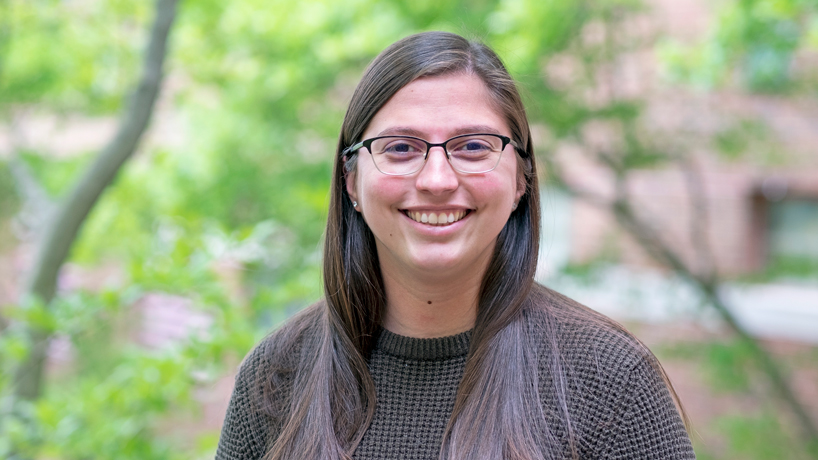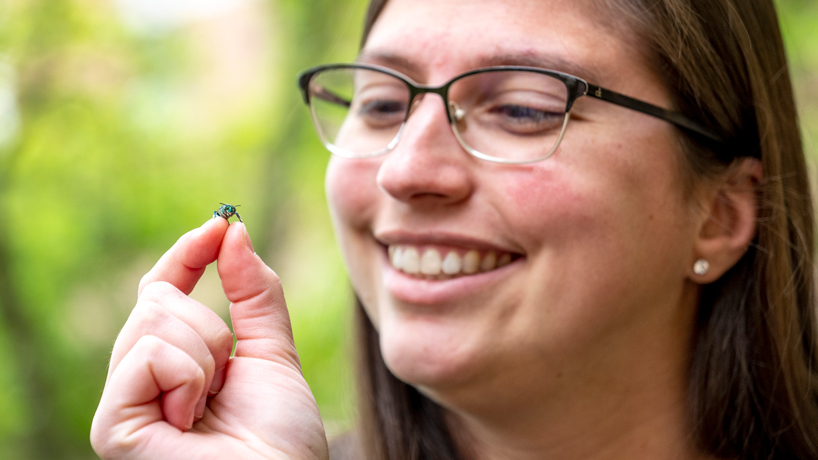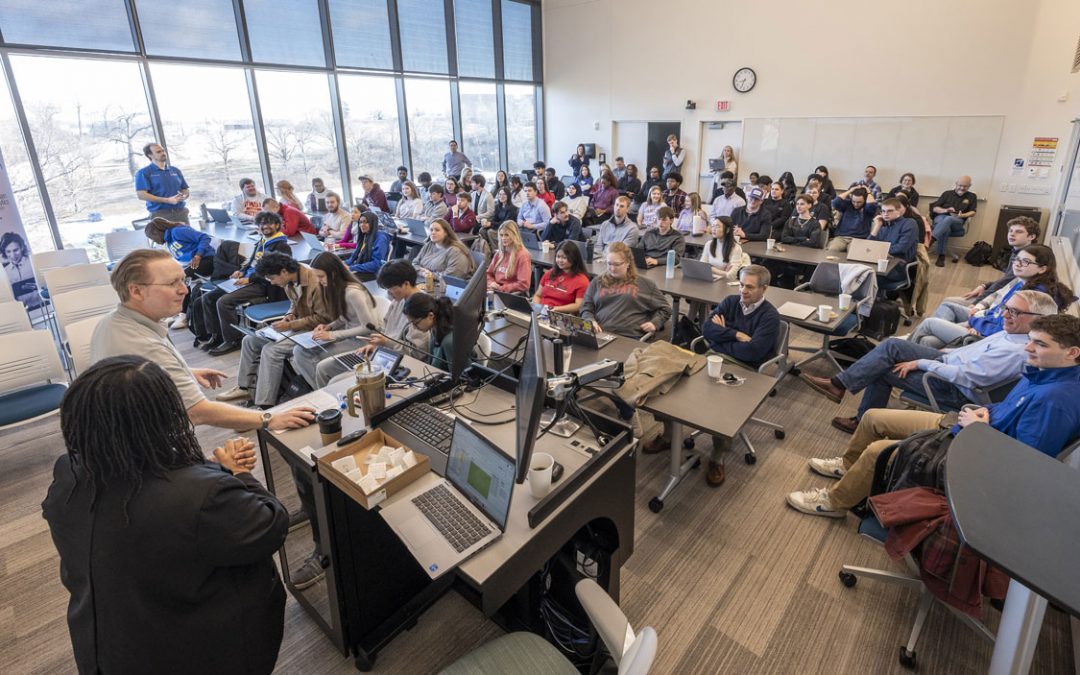
Andreia Figueiredo, a native of São Luís, Brazil, has been researching color vision in orchid bees as she pursues her PhD in biology. She expects to defend her dissertation later this year. (Photos by August Jennewein)
There’s a simple explanation for how Andreia Figueiredo came to start researching orchid bees: it was safer.
Figueiredo was an undergraduate biology student with a long-held interest in insects while studying at Universidade Federal do Maranhão in São Luís, Brazil. She’d been out in the field, conducting research on wasps, when she learned the hard way that she was allergic to them.
“I had a really bad reaction,” Figueiredo said of what happened after being stung. “Everything turned out fine, but I had to go to the hospital.”
It was scary enough that Figueiredo’s undergraduate research advisor ordered her off the project. But the advisor had another option involving male orchid bees, which do not sting.
“She’s like, ‘You can work on that one because that one is safe for you,’” Figueiredo said.
Andreia Figueiredo holds an orchid bee between her fingers. Figueiredo began researching the bees as an undergraduate student at Universidade Federal do Maranhão in São Luís, Brazil.
She soon fell in love with the bees, which include some 250 species found largely in rainforests throughout Central America and further south into Brazil. They typically visit orchids and other plants and are known for their metallic hues of green and blue.
Figueiredo was also intrigued by the behaviors she observed in the males, which use their front legs to collect scents from orchid flowers. They mix the odor with a substance they produce in their mouths to create a unique perfume that they use to attract females.
“Pretty much everything that we know about those bees, about their biology, has to do with scent and scent collection,” Figueiredo said.
For the past five years, Figueiredo has been working to add to the collective understanding by studying the importance of color vision for orchid bees while pursuing her PhD in the Department of Biology at the University of Missouri–St. Louis. Her dissertation research is focused on the color vision of a particular species now found in Florida.
“I found a little niche that no one was paying attention to,” she said. “I have projects looking at color vision at the physiological level – so, really looking at their eyes and the cells in their eyes. But most of my work has to do with behavior and how they use information about color to make decisions in their environments.”
She’s explored questions such as how color vision impacts flower selection and whether males and females are drawn to the same or different colored flowers. She hopes to gain a better understanding of their role as pollinators in the ecosystem.
Figueiredo credits her aunt for giving her love of nature and biology.
“I grew up in a city – very urban, an apartment, lots of concrete,” Figueiredo said. “But I had an aunt who took me and my brother on hikes, and she was always getting us outside and doing fun things.
“I just always wanted to understand more. I watched documentaries and thought about why animals do what they do and why everything works the way it works.”
She also had a sixth-grade science teacher with a background in biology who helped her confirm her passion for studying the science of life, and she stayed true to that throughout high school and into college.
Figueiredo switched paths temporarily after earning her bachelor’s degree in biology in 2014.
“I was applying for jobs, and I realized that all of my skills were not transferable to jobs other than biology,” she said. “I knew how to teach biology, how to read papers and how to design experiments. But there weren’t other jobs that I could do with that. It didn’t help that the economy in my state was not good.”
Instead, she enrolled in business school at Escola de Negócios Excellence to pursue an MBA, thinking it sufficiently broad and vague enough that it would help improve her job prospects. She appreciated the lessons she learned, but the experience served to reinforce that she belonged in biology, not business.
Figueiredo decided instead to pursue a PhD and was eager to explore opportunities abroad. She’d had good experiences spending a semester studying in Nova Scotia, Canada, in high school and a year in college at the University of Michigan. It gave her confidence she could navigate the educational system, and she believed a degree from an American university would serve her well anywhere in the world.
Maureen McGrath, a family friend living in St. Louis, was familiar with the UMSL’s biology PhD program and its Whitney R. Harris World Ecology Center and suggested Figueiredo look into both. The center is a partnership between UMSL, the Missouri Botanical Garden and the Saint Louis Zoo that helps train doctoral students in ecology and conservation in hopes that they move into positions where they can combat biodiversity loss around the globe.
McGrath put her in touch with Professor Bob Marquis, then the director of the Harris Center, and he gave her an overview of the program and connected her with Associate Professor Aimee Dunlap, whose lab focuses on investigating the role of environmental variability in the evolution and ecological function of cognition and conducts research on different species of bees.
The more she learned about UMSL, Dunlap’s lab and the partnership with the Saint Louis Zoo, the more it seemed like an ideal fit, and the Harris Center offered the promise of funding opportunities to support her study and research.
UMSL wound up being the only program she applied to, and she’s never regretted the decision since she arrived in St. Louis in the fall of 2016. She became fast friends with other students in the department and took advantage of opportunities to get involved at the Harris Center, serving as a chair of the student committee and also a student representative on the executive committee.
She’s been a mentor for others.
“Throughout her research she’s worked with undergraduates and high school students, sharing her enthusiasm for orchid bees, and training them in hands-on research,” Dunlap said. “Andreia is always the first volunteer in the lab when we go and work on outreach events in the community, and honestly, she is an outreach superstar. She’s created games and materials for children, and it has been fun to watch.”
Figureiredo has also tapped into the expertise at the Saint Louis Zoo’s Insectarium to enhance her learning and help advance her research.
The past 15 months have brought plenty of challenges as the world has coped with the COVID-19 pandemic, and Figueiredo has not escaped unscathed.
“The pandemic has been a heavy blow to her work, right at the moment so much was coming to fruition,” Dunlap said. “I am proud of her for not being defeated and for regrouping and making some excellent contingency plans to complete her research. Andreia has faced an above-average amount of failures during her time in our graduate program, none of which have been her fault. And yet she has never once given up and continues to push forward with her work.”
Figueiredo, who got married last fall, admits to missing the social interaction and the chance to bounce ideas organically off her fellow students when they could work side-by-side or have lunch together. But she also feels lucky that, because the bees she studies are in Florida, she didn’t have to navigate the shutdowns to international travel that have impacted some of her friends’ research.
This summer, she is completing the final experiments for her dissertation project and is on track to defend her dissertation by the end of the year.
She doesn’t know what she’ll do next, but she’d like find work in the United States for at least a few more years.
“I have a good professional network that I’ve built here,” Figueiredo said. “I have good connections that can write me reference letters, can help me find jobs, can help steer me to a good direction professionally. I really want to take advantage of that and stay here for at least a little longer.”















